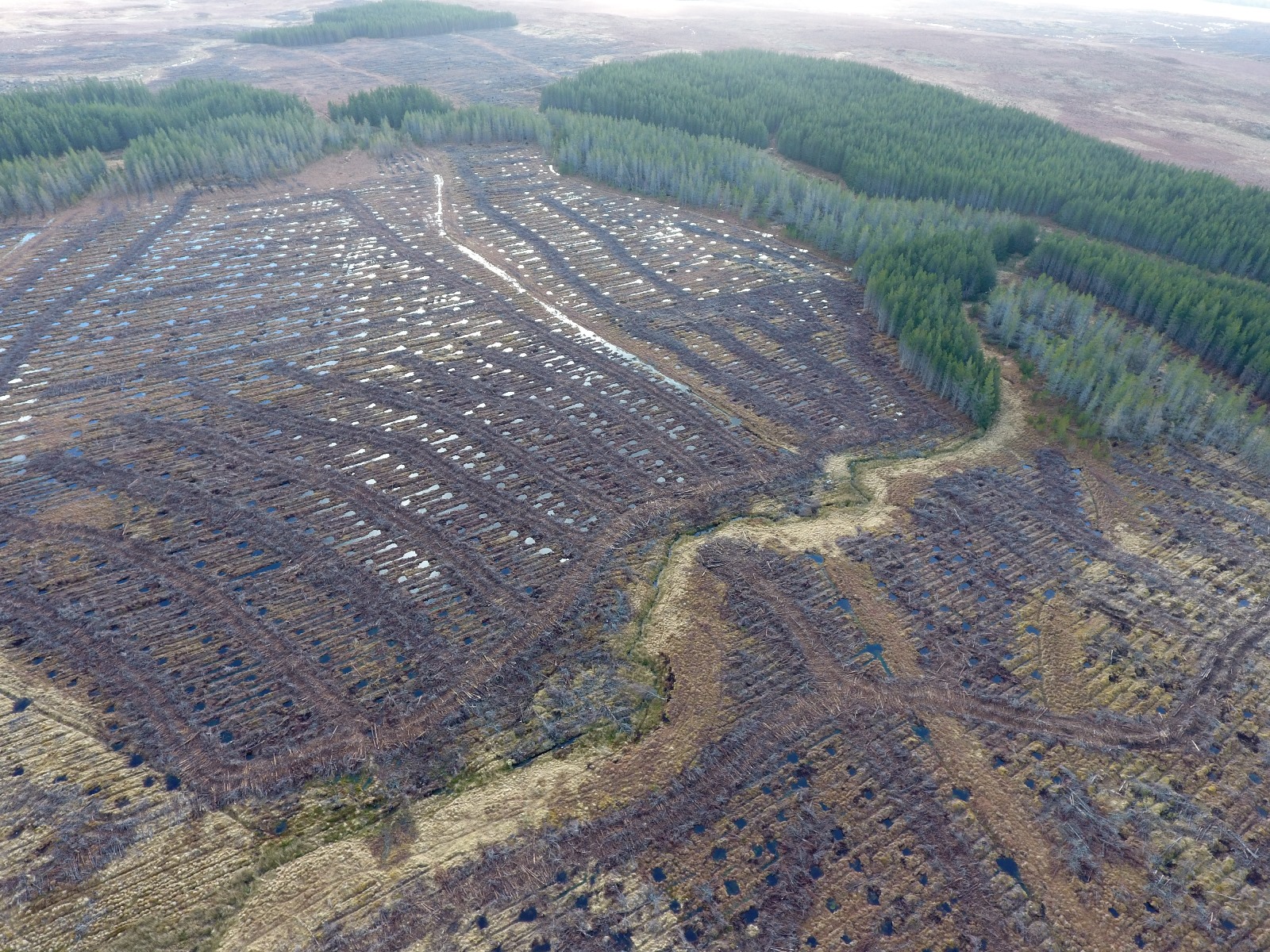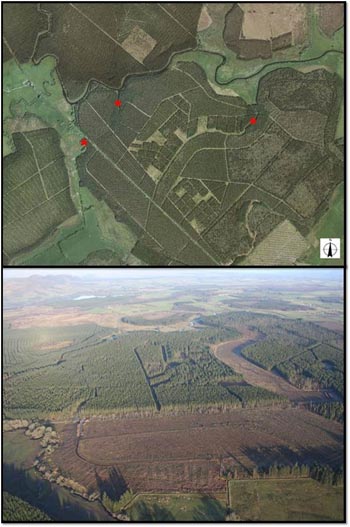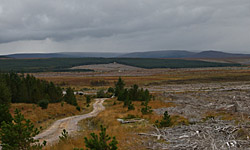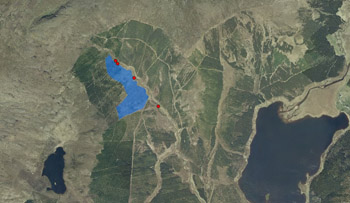Summary
We are investigating the effects of peatland restoration on water quality.
The research focuses on the effects of forest clearance and management techniques such as drain blocking, ground smoothing and mulching on water quality, with a focus on nutrient and dissolved organic carbon transport.

Photo credit: Neil McInnes
Our studies span five locations across Scotland including sites sensitive for freshwater pearl mussels and Atlantic salmon. Study locations include Flanders Moss, a large raised bog in central Scotland, blanket peat in northern Scotland and an intermediate bog in Galloway, southern Scotland.
Flanders Moss restoration
Summary
This project aims to assess the impacts of peatland restoration by clearfelling on water quality focusing on phosphorus and dissolved organic carbon (DOC) transport. Phosphorus losses can have negative impacts on aquatic ecology including the freshwater pearl mussel and salmon, whilst DOC losses are important from both an ecological and a climate change perspective.
Research objectives
- Monitor drainage water quality by collecting water samples in three catchments at Flanders Moss, a raised bog in Central Scotland.
- Interpret the results in terms of potential impacts upon aquatic ecology and the carbon balance.
- Assess whether there is a need for improved guidance on best practice for forest removal during peatland restoration.

Results so far
Preliminary results indicate that phosphate concentrations increased at all three monitoring sites following felling, but differences between the sites reflect local conditions and the management techniques employed. DOC concentrations increased at two out of three sites, but the increase appears to be short-lived.
Status
The project began in 2008 and is due to be completed in 2018, although some components may continue beyond that time. Data is still being collected at the sites with additional monitoring in place to look at the effects of mulching on water quality. The results are now being prepared for presentation and publication.
Related Products/Services
The results will assess the need for improved guidance on best practice for forest removal for peatland restoration
Contact
Funders and partners
Forestry Commission and Forestry Commission Scotland. This research is primarily funded by the Forestry Commission delivering resilient forests research programme.
Forestry Commission policy
The protection of the water environment is a key element of sustainable forestry and this research directly supports the Forestry Commission policy of achieving sustainable forest management in the UK.
In addition Country Forestry Strategies (Scotland, England, and Wales) identify the need to protect and enhance water resources with the water related aims based on the EU Water Framework Directive (2000), which establishes the principal framework for protecting and improving the water environment
The effects of peatland restoration and on-site forest materials on water quality
Summary

Different management techniques are employed to deal with tree material generated during clearfelling on peatland restoration and wind farm development sites. Where timber is not deemed suitable for sale, the preference in many cases is to leave the tree material on-site often as mulch (chipped) or brash. This collaborative project is investigating whether the restoration techniques lead to negative environmental impacts on soil and water quality and, subsequently, on ecology and river morphology. We have two experimental sites, one on the RSPB’s Forsinard Flows Reserve and the other in the River Oykel catchment on the National Forest Estate.

Research objectives
- Investigate the effects of peatland deforestation on water quality focusing on material left in-situ.
- Explore management options to reduce nutrient runoff from restoration sites.
- Interpret the results in terms of potential impacts upon aquatic ecology and the carbon balance.
- Assess whether there is a need for improved guidance on best practice for forest removal during peatland restoration.
Results so far
Baseline data is now being collected
Status
The project began in 2017.
Related Products/Services
The results will assess the need for improved guidance on best practice for peatland restoration by clearfelling.
Contact
Funders and partners
- Forestry Commission
- Forest Enterprise Scotland
- Scottish Environmental Protection Agency (SEPA)
- Royal Society for the Protection of Birds (RSPB)
- Strath Halladale Partnership
This research is primarily funded by the Forestry Commission delivering resilient forests research programme and through Service Level Agreements with Forestry Commission Scotland and Forest Enterprise Scotland.
Forestry Commission policy
Protection of the water environment is a key element of sustainable forestry and this research directly supports the Forestry Commission policy of achieving sustainable forest management in the UK.
In addition Country Forestry Strategies (Scotland, England, and Wales) identify the need to protect and enhance water resources with the water related aims based on the EU Water Framework Directive (2000), which establishes the principal framework for protecting and improving the water environment.
Research Objectives
Understand the effects of peatland restoration on water quality by undertaking water quality and flow monitoring before and after restoration.
Interpret the results in terms of potential impacts upon aquatic ecology and the carbon balance.
Based upon the findings of the project, assess the effectiveness of the existing water guidelines for controlling potential impacts, identify any deficiencies or gaps and, if needed, provide additional guidance on operational practice for water protection.
Latest Update
Results from Flanders Moss show that forest clearance for peatland restoration can impact negatively upon water quality due to phosphate, DOC, colour and suspended sediment releases. The mechanisms by which the releases occur require further investigation but are thought to be driven by nutrient leaching from forest residues, soil disturbance by machine trafficking and indirect effects of forest clearance, such as water table rise following cessation of forest water use. Climatic effects also play a significant role, particularly drying-rewetting cycles and periods of extended drought. To prevent negative impacts, phased felling and less intensive forest harvesting techniques should be employed.
Our Involvement
FR are leading the studies including the fieldwork, data analysis and interpretation and reporting.


